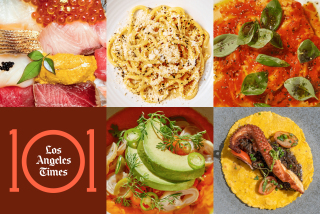A tasty tool of change
IT’S tough to look masculine in a hairnet and booties, even if you’re carrying a very sharp knife toward a slab of meat swinging on a warehouse hook. But the kebab boys, pepper spice dusting their hands, don’t seem to mind, preferring to think of themselves as culinary ambassadors.
To understand the metaphor one must appreciate the sauce-drenched, onion-scented, shaved-meat beauty in a pita known as the doner, or spinning, kebab. Fat and messy, it is the Turkish immigrant’s gift to Germany, a bit of meal-time chaos in a nation that doesn’t like its peas to roll too close to the mashed potatoes.
Integration is often not a success story here, but the kebab has found a home, slipping in amid the sausage and beer like a distant, exotic uncle. It’s munched on the run and can fill the brawniest of laborers. When the bars close, and the soul is still restless, the kebab beckons, a late-night snack for the subway ride home. It sheds lettuce, bleeds tomatoes and has challenged dry cleaners from Hamburg to Hesse.
Now that maddeningly persistent German virtue known as order is being imposed on the untidy kebab. The Vocational School for Gastronomy and Nutrition here is offering a six-month course that in July will award the first kebab diplomas, officially known as Meat Processing Doner Kebab Production Specialization. If there is poetry in bureaucracy, the Germans have yet to stumble upon it, but the point is to regulate a loose market of vendors and producers.
And that, surprisingly, may improve integration in a country where more than 2 million Turks live in what many consider a parallel world. The aim is to enhance the image of the kebab industry and give its workers, most of whom are first- and second-generation Turkish immigrants with limited educations, training toward better opportunities.
“In Germany if you are not integrated in the labor market, you are not integrated,” said Metin Harmanci of Entrepreneurs Without Borders, an organization that advises immigrant businesses and seeks equality in the workplace. “It’s difficult for immigrants to enter the labor market. It was easier in the past when Germany needed guest workers, but now that kind of work is gone and there are fewer chances.”
Skeptics in the German media view the plan as noble but Sisyphean. The website for Deutsche Welle radio put it like this: “While encouraging young people to get a start in life with a vocational qualification is a worthy cause, one would have to search high and low to find a pursuit that is less appreciated and undervalued by the customer in the fast-food sector than the high-quality preparation and presentation of a kebab.”
IT begins in a meat factory with sawed bones and a dangling carcass. Mostly veal, the meat is cleaved and flattened, trimmed of fat. It is seasoned with white pepper, chili powder, yogurt, onion and secret spices. Thin strips are stacked on a spit about 3 feet high. The meat is pressed together, furiously wrapped in plastic, frozen and loaded on trucks for delivery. Each morning, sometimes before dawn, fresh spits, spinning and sizzling, appear in kebab shop windows across Germany.
Thousands of spits have passed through the hands of Mehmet Atug. A Kurd from eastern Turkey, he was 12 when his family paid a smuggler to sneak him into Germany. Atug lived illegally for years but now has residency papers and works for Ertan Celik, an immigrant and manager of a kebab meat plant. Atug is friendly but reticent; he doesn’t know his future and won’t pretend to say.
“I want to finish this training and hold a certificate in my hands,” said Atug, 25, a compact man with quick eyes. “The first five years I was in Germany I longed for my native Turkey. But after so many years of living here, I guess I can imagine dying here. The best opportunities for me are in Germany and Europe.”
Dozens of men like Atug work in the kebab plants at an industrial park near this port city. They smoke, drink tea at lunch, removing their hairnets and brushing herbs and meat off white smocks that glow like starched flags in the sun. They speak a mixture of Turkish and German, the older ones instructing the younger, cobbling sentences and deciphering the rhythms of life in the north.
They are the echoes of their fathers and cousins who arrived decades earlier to help rebuild Germany after the war. Back then, most Turks didn’t plan on staying; the Germans were not entirely welcoming, but gradually neighborhoods changed and the guest worker became permanent boarder. Today, many second- and third-generation Turkish Germans carry German passports and are fluent in the language of their adopted nation, but they feel estranged, as if searching for an opening in an invisible, yet impenetrable, cultural scrim.
“Many of my workers have this biography. They have been people in limbo,” said Celik, who has 51 employees and knows the education and other discouraging statistics that define the immigrant class. “Integration is a real bone of contention in Germany. It is the problem caused by politicians 20 and 30 years ago who didn’t see what was happening.”
The mosque and the head scarf may have been met with suspicion, but the kebab entered with panache, a curiosity that became an icon, a fast food that many Germans favor over other culinary imports such as McDonald’s and Burger King.
Durmus Kenan, manager of a kebab plant next door to Celik’s, ventured into the meat business years ago when kebab bigwig Remzi Kaplan advised him to abandon his vegetable stand and find a “kebab niche in Hamburg.”
“By then the popularity of the doner kebab was spreading from West Berlin where it was first introduced in the 1970s,” said Kenan, the son of an immigrant janitor. “The Germans loved it immediately.”
A cheerful man with combed-forward black hair, Kenan has made a career out of the kebab and feels mostly at home amid Hamburg’s docks and ship horns. “Integration is working for me. My children were born here. They go to German schools. They see that when we visit Turkey we’re considered foreigners. It’s a little different for me, though. I feel half and half.”
IN 2006, kebab sales tumbled by as much as 30% when a contaminated meat scare swept Germany. Celik, Kenan and Entrepreneurs Without Borders sought to protect the kebab’s stature and fate by pushing quality control that included training workers to cut, prepare and package meat. The project was funded by the city’s labor office and the intention is to eventually set standards for warehouses, production plants and even for tiny kebab shops run by non-hairnet-wearing guys who may not always clean the lettuce bin.
Will this be appreciated? Again, Deutsche Welle thinks not. It believes that the kebab maker’s “labor of love” will be met with drunken Germans heading home in predawn twilight who will “snatch ... the doners from the hands that created them; spilling half on the pavement outside, wolfing most of it without the contents even touching the sides of their mouths and then puking the rest into the shopping basket of a nearby bicycle.”
Kenan is not deterred. He slipped on blue booties and walked through his plant, past crates of meat and spiced scents that lingered in the chilled air as young men with knives and faces covered by antiseptic masks twirled spits and cut meat.
Turan Ertas, his nose red from the cold, stood amid the clatter. He was born in Ankara and migrated to Hamburg six years ago; he’s learning German by watching television and is mystified by this country’s rules and regulations “even for the traffic.”
“I like organization. In Turkey, there is not so much structure,” he said. “I married a Turkish woman who was here and I was accepted right away by her family.... I’ve noticed in Germany, though, human empathy gets lost. Individually there’s more freedom, but you lose the sense of family and being connected to people. It’s more of an elbow society, but overall I’m happy.”
ERTAS’ shift ended at 3 p.m. He hurried across town to the Vocational School for Gastronomy and Nutrition, which some have dubbed Doner University. He sat in a hard-back chair alongside 15 other students. They pulled out pencil and paper and watched a big man with a flowing apron lay a hacksaw, knives and a silver metal glove on a steel table. The teacher then hauled in a side of beef and plunked it down with a clang.
“Take care that you only saw through the bones and do not injure other parts,” said the teacher, working the saw, perspiring. “As I mentioned, you will mainly use breast and belly, but there are also neck, shoulder and, last but not least, the leg and the back, including the best and most valuable part, the filet. You could use these parts too, but then your kebab would become too expensive.”
A few smiles.
The teacher cut and weighed, speaking of muscle, veal and fibers. It seemed a mystery, a thawing red map of marbled lines.
The students studied and scribbled; this is it, their new profession, maybe not forever, maybe just until that promise of something better comes along, but for now life is a sharp knife skimming the bone.
*
More to Read
Eat your way across L.A.
Get our weekly Tasting Notes newsletter for reviews, news and more.
You may occasionally receive promotional content from the Los Angeles Times.







